
What’s as bad for your health as smoking 15 cigarettes a day?
What poses a greater health risk than obesity?
According to U.S. Surgeon General Vivek Murthy the answer is: Loneliness.
“Loneliness is more than a bad feeling,” Dr. Murthy said. “It has real consequences on our mental and physical health. It increases our risk of depression, anxiety and suicide, as well as heart disease, dementia and stroke.”
Dr. Murthy says one in two adults report feeling lonely or isolated. This time of year can heighten those feelings. A national survey showed 64 percent of people with a mental illness reported their conditions worsened around the holidays.
And it’s not just the holidays.
“What I am noticing since the pandemic is that we are realizing we are more lonely than ever before,” said Angela, Adult Outpatient Mental Health therapist at LifeWorks NW. “Not only the lack of connections, but also the quality of the connections impact our mental health and overall well-being.
“I am seeing more and more adults seeking more meaningful connections but don’t know where to start. Social media and technology exacerbated this. It’s like we have to relearn connecting with others on a more personal level.”
Angela offers several ideas to get started: “Take small steps to form more meaningful connections with those around us, in our families, (in) community activities, even exploring hobbies or joining a group. Local libraries have events. The National Alliance on Mental Illness has various groups to explore. In Washington County, NAMI has an art room where folks can use their materials to create art.”
While technology can isolate, Angela pointed out ways it can connect, too: “Nolongerlonely.com, Facebook groups, meetup.com. You have an interest? There is probably a group for that.”
Her counsel echoes that of Dr. Jeremy Nobel, a primary care physician and author of Project UnLonely, which offers a road map to connecting:
- Make something.
- Have a conversation.
- Be curious and share an interest.
- Reach out to people who might be lonely.
“Just like thirst is a signal you need hydration, loneliness is a signal that you need human connection,” says Dr. Nobel.
“There’s just no substitute for human connection,” Dr. Murthy says. “There are steps we can take today that will make a difference. Just spend 15 minutes with someone you care about, fully present and not distracted. Look for ways to help others. Small acts of service can be powerful in helping us to feel connected.”
In relearning to reach out, Angela says, “Be kind to yourself and let go of rules or expectations about connecting with others. Be you in however much or little you decide to show in that moment.”
Angela likes to quote the fortune cookie she got years ago: “Begin. The rest is easy.”
Learn more:
U.S. Surgeon General report, 2023 (pdf): Our Epidemic of Loneliness and Isolation
Dr. Vivek Murthy interview (video)
Resources
- Supporting Your Mental Health During the Holiday Season from Substance Abuse and Mental Health Services Administration (SAMHSA)
- The Senior Loneliness Line of Oregon, a free, statewide 24/7 call service for Oregonians 55 and older. Call 503-200-1633 or 800-282-7035.
- Call or text 988 or chat at 988Lifeline.org to reach trained crisis counselors at the Suicide & Crisis Lifeline. Spanish speakers can call 988 and press 2, or call 888-628-9454 to reach la Red Nacional de Prevención del Suicidio, text the word “AYUDA” to 988 or chat online at 988lineadevida.org.
- Oregon YouthLine is a teen-to-teen crisis and help line. Call 877-968-8491 or text teen2teen to 839-863. Trained teens are available to help daily, 4 p.m. to 10 p.m. (adults are also available 24/7).


